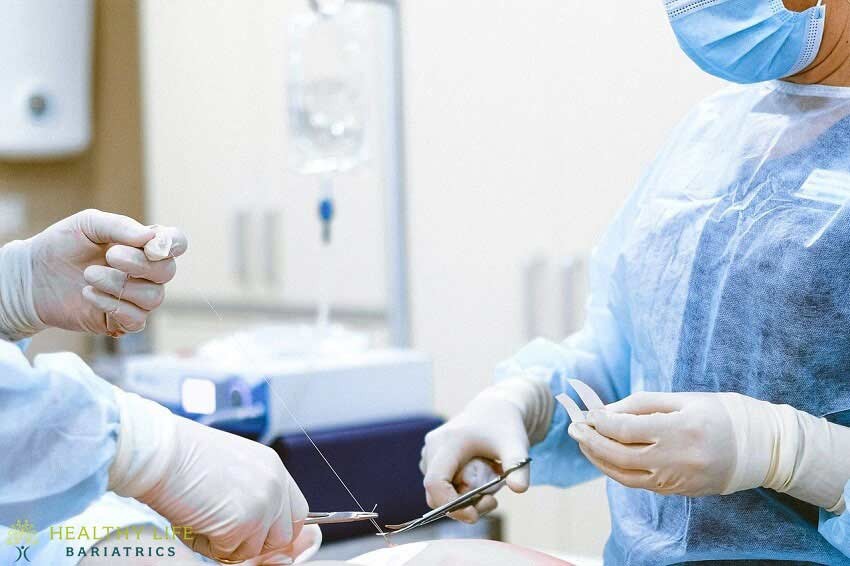An inguinal hernia occurs when tissue protrudes through a weakened spot in the ab muscles. The tissue could be a portion of the intestine, another organ, or fatty tissue. Many people experience a bulge when an inguinal hernia is present, especially when coughing, bending over, or lifting heavy objects. Not everyone with an inguinal hernia feels pain. The recommended treatment for an inguinal hernia is laparoscopic surgery.
Will an Inguinal Hernia Heal by Itself?
An inguinal hernia is not necessarily dangerous, but the condition will not improve on its own. Over time and left unchecked, an inguinal hernia can cause dangerous complications. Doctors typically recommend surgery to repair inguinal hernias that become enlarged and cause pain. Inguinal hernia repair is a safe, everyday surgical procedure.
Understanding Inguinal Hernias
Before diving into surgical approaches, it's essential to understand the basics of inguinal hernias. These occur when tissue, often part of the intestine, protrudes through a weakened area in the abdominal muscles. Inguinal hernias typically manifest as a bulge in the groin area and may cause pain or discomfort, especially during activities such as lifting or coughing.
What are the Symptoms of an Inguinal Hernia?
The first sign of an inguinal hernia is usually a bulge on either side of your pubic bone. The bulge may be obvious when standing upright, and when coughing or straining. Some people experience accompanying pain or a burning sensation. Others feel a heavy or dragging sensation or pressure in the groin area.
You may also experience pain if the hernia becomes trapped, a condition known as incarceration. If this happens, seek medical help right away.
- Groin Bulge – A distinct soft mass swelling worse when standing upright, coughing, or lifting heavy items. Often disappears when lying down.
- Groin Heaviness/Aching – Sensations of dragging pressure or pain, especially after long periods of standing.
- Weakness or Burning – Vague abdominal discomfort without clear bulging may occur.
Signs of incarceration or strangulation development prompting potential emergency surgery include:
- Sudden severe groin pain with associated nausea and vomiting
- Inability to pass stool and gas
- Shrinking or redness involving overlying abdominal skin
- Fevers concerning infection risk
When Should You See a Doctor About an Inguinal Hernia?
If you have unexpected pain, a bulge, or other sensations originating in the groin area, you may have an inguinal hernia.
You can attempt to push the contents of the hernia back into place. If that doesn't work, the contents may have become trapped behind the abdominal wall. That trapped tissue can become strangulated, which cuts off blood flow. This can be life-threatening if the hernia is not treated.
You should see a doctor if any of these signs are present. You should also see a doctor if you experience nausea, vomiting, fever, sudden pain that intensifies, constipation, and a hernia bulge that steadily grows purple, red, or otherwise dark.
An official diagnosis is needed before you can have hernia correction surgery.
How Doctors Diagnose Inguinal Hernias
Physical examination alone suffices for most straightforward inguinal hernia diagnoses. Inspection and palpation while patients stand and cough elicit characteristic findings:
- Groin Bulge – The hernia sac protrusion becomes evident.
- Impulse on Coughing – Light finger pressure internalizes bulging tissue.
- Smooth Reducibility – Gently pushed tissues to slip back into normal abdomen anatomy readily.
- No Other Masses – Checking for enlarged lymph nodes or lipomas elsewhere proves important.
With obese body habitus obscuring exams or equivocal presentations, various imaging tests help confirm pathology:
- Herniogram – Dye injected at the groin enables mapping hernia sack communications.
- CT Scan – Thin sliced axial groin imaging reveals muscular defects not apparent externally.
MRI – Assesses soft tissues without radiation but rarely necessitates.
What Causes an Inguinal Hernia?
An inguinal hernia could occur because of increased pressure inside the abdomen. You might have a preexisting weak spot in your abdominal muscles. Other causes include straining during bowel movements, strenuous exercise, pregnancy, and chronic sneezing or coughing.
Many people with inguinal hernias have weakened abdominal walls. The muscles may not have formed properly in the womb. The muscles also become weaker with age. The older you get, the more at risk you are for experiencing one of these hernias.
In men, the weakened spot usually occurs in the inguinal canal. This is where the spermatic cord enters the scrotum.
In women, the inguinal canal houses a ligament that stabilizes the uterus. Hernias in women sometimes occurs when connective tissue from the uterus attaches to pubic bone tissue.
- Congenital Anatomic Defect – Existing since birth when abdominal wall fusion through the inguinal canal fails.
- Heavy Lifting/Straining – Chronic coughing fits, constipation from straining to defecate, obesity weight, or intense vomiting episodically increase abdominal pressures.
- Prior Surgery – Any prior abdominal operations resulting in weakened scar tissue could contribute.
- Family Tendency – Inheritable connective tissue disorders like Ehlers Danlos Syndrome predispose some patients.
- Smoking – Chemical carcinomaigens and chronic obstructive lung disease exacerbating coughs impair tissue integrity over decades.
Aging – All muscles and fascial connective tissues naturally weaken over time. Men over 45 years and women over 60 years old have substantially higher hernia risks, even without clear inciting events.
How is an Inguinal Hernia Repaired?


Laparoscopic hernia repair is a surgery performed under general anesthesia. Keyhole incisions (tiny) are created just below and around the navel. Dr. Moeinolmolki then inflates your abdomen with air to give the laparoscopic tools room to work. The tools are inserted into the incisions, allowing Dr. Moein to see the internal structure of your abdomen.
The tools allow Dr. Moein to use meticulous techniques to repair your hernia without the need for open surgery. A mesh may be placed over the hole in your abdominal wall to reinforce the weakened spot. Whether mesh is used or not, the edges of the healthy abdominal muscle are sewn together.
Though the surgery sounds simple in scope, there are risks. All surgeries come with risks.
What are the Risks of Inguinal Hernia Surgery?
If you have been deemed a suitable candidate for inguinal hernia surgery, you know you have passed Dr. Moeinolmolki's stringent requirements. Ideal candidates are healthy, non-smokers, without evidence of blood clots in their medical history. This reduces most risks to your health.
There are always risks in using anesthesia, and fluid buildup and hematomas (bleeding) can occur, but these are rare. Dr. Moein will discuss infections and other risks, as well as the benefits of hernia repair surgery, during your initial consultation.
What are the Benefits of Laparoscopic Inguinal Hernia Surgery?
The most significant benefit of inguinal hernia surgery is reduced postoperative pain. You can also return to work quicker than if you were to have open surgery. Because the abdominal wall is strengthened, you are less likely to experience a hernia in the future.
Exploring Surgical Techniques
Open Inguinal Hernia Repair:
Traditionally, open surgery has been a standard approach for inguinal hernia repair. This involves making an incision directly over the hernia site, pushing the protruding tissue back into place, and reinforcing the weakened area with mesh or sutures1. While effective, this method has seen advancements aimed at reducing recovery times and minimizing scarring.
Laparoscopic Inguinal Hernia Repair:
Laparoscopic or minimally invasive surgery has gained popularity for inguinal hernia repair. Surgeons make small incisions and use a camera to guide the repair process, offering benefits such as faster recovery, less postoperative pain, and a lower risk of infection.
Robotic-Assisted Inguinal Hernia Repair:
Similar to other hernia surgeries, robotic-assisted techniques have emerged as a precise and innovative option for inguinal hernia repair. Surgeons control a robotic system to perform the procedure, enhancing accuracy in delicate maneuvers3.
Advancements in Inguinal Hernia Surgery
Mesh Selection and Biologic Mesh:
The use of mesh during inguinal hernia surgery is standard practice. Advances in mesh materials, including synthetic and biological options, have contributed to improved outcomes. Biologic mesh, derived from natural sources, offers an alternative with potential advantages in certain cases.
Tension-Free Techniques:
Modern inguinal hernia repair techniques emphasize tension-free approaches. These methods focus on using mesh to provide support without placing undue stress on the surrounding tissues, reducing the risk of recurrence5.
Postoperative Care and Recovery
Physical Activity and Rehabilitation:
Post-surgery, a gradual return to physical activities is typically recommended. Physical therapy exercises play a crucial role in strengthening the abdominal muscles, promoting a faster recovery, and reducing the risk of recurrence.
Dietary Guidelines for Inguinal Hernia Recovery:
Proper nutrition is vital for healing after inguinal hernia surgery. Dietary recommendations often include a balanced intake of nutrients to support tissue repair and minimize the risk of complications during the recovery period.
Pain Management Strategies:
Understanding and implementing effective pain management strategies post-surgery is key to a smooth recovery process. This may include medication, ice therapy, and other non-pharmacological approaches.
What Else Should You Know about Inguinal Hernia Surgery?
Laparoscopic inguinal hernia surgery is safe and the chances of the problem returning are low. If you experience pain or worry about your hernia posing a threat to your health, get an official diagnosis by calling Healthy Life Bariatrics in Los Angeles, California. Dr. Moein can meet with you during a private, one-on-one consultation to discuss hernia surgery and what it can do for you. (310) 807-2378
